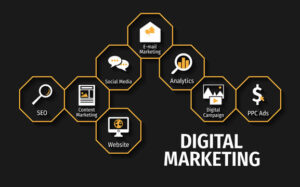Digital marketing encompasses all marketing efforts that use electronic devices or the internet. Businesses leverage digital channels such as search engines, social media, email, and other websites to connect with current and prospective customers. Here are some key components and strategies within digital marketing:

- Search Engine Optimization (SEO): Optimizing your website to rank higher in search engine results pages (SERPs) organically. This involves keyword research, on-page optimization, link building, and technical optimizations.
- Content Marketing: Creating and distributing valuable, relevant, and consistent content to attract and engage a target audience. This can include blog posts, articles, videos, infographics, and more.
- Social Media Marketing: Promoting your brand and content on social media platforms such as Facebook, Twitter, Instagram, LinkedIn, etc. This involves creating and sharing content, engaging with followers, and running paid advertising campaigns.
- Email Marketing: Sending personalized and targeted emails to nurture leads and maintain customer relationships. Email marketing can include newsletters, promotional offers, and automated email sequences.
- Pay-Per-Click (PPC) Advertising: Running paid advertising campaigns on search engines (Google Ads) or social media platforms (Facebook Ads, LinkedIn Ads, Twitter Ads). Advertisers pay a fee each time their ad is clicked.
- Affiliate Marketing: Partnering with other businesses or individuals (affiliates) who promote your products or services in exchange for a commission on sales generated through their referral.
- Influencer Marketing: Collaborating with influencers or individuals with a large following on social media platforms to promote your brand or products to their audience.
- Marketing Automation: Using software platforms and tools to automate repetitive marketing tasks such as email marketing, social media posting, and lead nurturing.
- Analytics and Data Analysis: Monitoring and analyzing data from digital marketing campaigns to measure performance, identify trends, and make data-driven decisions for optimization.
- Mobile Marketing: Optimizing marketing efforts for mobile devices such as smartphones and tablets. This includes mobile-responsive website design, mobile apps, and location-based marketing.
Digital marketing allows businesses to reach their target audience more effectively, track the performance of their campaigns in real-time, and adjust strategies accordingly to achieve better results. It continues to evolve with advancements in technology and changes in consumer behavior.